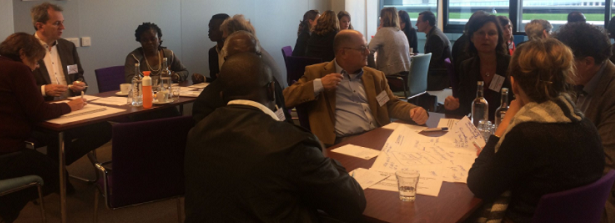Co-designing sustainable inclusive (peri-)urban city feeding

Urban food systems are becoming increasingly important as a way of feeding the world’s growing urban population. In the session on urban food systems, Nicky Pouw from the University of Amsterdam urged participants to build in circular economy objectives and become more socio-economically viable and sustainable in order to grow urban food systems. She pointed out that the contribution by urban agriculture is vital to poor urban dwellers, but limited in scale due to the limited space in cities and the inefficiency of urban agriculture. She added that Dutch policies should focus more on regional rural-urban interfaces to support urban food systems.
These statements were captured in the concept note on this theme, which was developed in preparation for this session by researchers from the Global Challenges Programme (GCP) and the Applied Research Fund (ARF) in collaboration with Dutch policy representatives.
Pouw’s introductory pitch was followed by Donald Houessou of ACED on the Allotment of Urban Gardens GCP project in Benin, Dzidzo Tawiah-Yirenya on the Utilization of Organic Waste ARF project in Ghana, and again Nicky Pouw on the Women’s Food Entrepreneurship GCP project in Kenya and Burkina Faso. Pouw explained that the latter project works with an interdisciplinary research group (both technical and social scientists), as well as women’s groups, city governments and the business community, “based on an integrated understanding of the complex interaction between soil quantity, food production, and quality for vulnerable groups”.
After the presentations, the 25 participants broke into several roundtable discussions. The concept of a circular economy – a Dutch policy objective – appeared to be quite new for some of the African participants. However, Joseph Hounhouigan from University of Abomey-Calavi shared that vertical agriculture, which is one of the answers to the limited space for urban agriculture, has recently been researched in Benin. Some of the elements of a circular economy were certainly addressed in many of the projects, such as the use of waste for compost in urban garden lots. It was suggested that Dutch knowledge about waste management might be useful here.
It proved useful to link the circular economy objective to the rural-urban interface, especially within a more ‘peri-urban’ approach: the city and its surrounding agricultural areas. A debate emerged between Monique Calon of the Ministry of Foreign Affairs, researchers from the ARF project Safe and accessible greenhouse production of (fruit) vegetables in Ghana (Fresh Green Ghana) and Edgar Deguenon from Hortitechs Benin. Calon was initially sceptical about whether or not urban agriculture would be able to feed the large populations in cities. In response, the researchers made it clear that peri-urban food production, which makes use of the space around cities, has great potential for upscaling. Calon closed the session with “here sits a convinced policymaker”.
However, these peri-urban food systems and their dynamics first need to be analysed before introducing new circular economy ideas. Some participants stated that Dutch experience with ‘feeding the cities’, horticulture and logistics might be useful for African cities. The awareness in Africa that not all urban space should be filled with asphalt and houses could be enhanced. Robert Dijksterhuis of RVO gave the example of a Dutch spatial and land use planning project in the city of Kampala, which decreased the distance between agricultural production and the market, thus reducing transport and traffic.
Others said that to start from local knowledge and develop this further could be more efficient in some cases than pushing new concepts. There is a lot of local knowledge and more effort is needed to find it, which is what many ARF projects are trying to do. For example, to diminish the growing plastics problem in Benin’s cities, burnt banana leaves are being used to package food products.
Similarly, the participants shared information about how the ARF and GCP research projects can become socially and economically sustainable. For example, Donald Houessou said that the “allotment of urban gardens project” purposely tried to involve more vulnerable people and work from the perspective of small-scale producers. There seemed to be opposing views about the need to professionalize food production (and to what extent), as this could risk excluding the poorest and less educated. Especially within cities, an adequate balance is needed. According to Houessou, “Professionals have the opportunity to set up a farm outside the city, but small scale farmers should be supported within the city”.
This seemed to have been an overarching theme during the conference: Should food and nutrition security (FNS) policies be focused on efficiency and professionalization to expand food production, which will exclude the poorest? Or should they involve vulnerable people and try to increase their food security? The latter presumes other methods. Here, the link between policy objectives and research priorities is clear: the answer to the above is a policy (or political) matter – although policy is not resolved about this either (Economic Affairs and RVO focus more on the professionalization and upscaling of production, sometimes combined with Dutch knowledge and experiences, while the DGIS directions seem inclined to focus on the poorer groups).
Background information
- Download the concept note (PDF).
- Download the session sheets (PPT in PDF).
- Read the blog “Reflection on Research & policy: two peas in a pod? A dialogue for food security impact” by Edith van Ewijk, Mirjam Ros-Tonen, Nicky Pouw en Joeri Scholtens (Governance and Inclusive Development group).
Watch the interview with Nicky Pouw (Video by The Broker)





